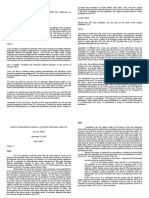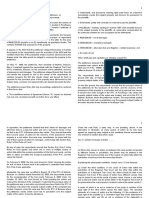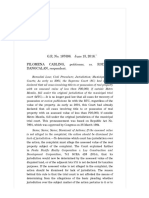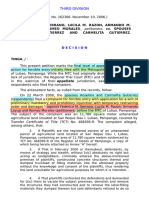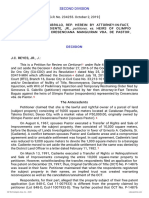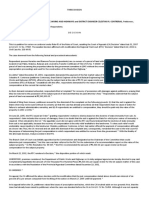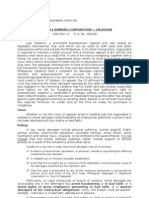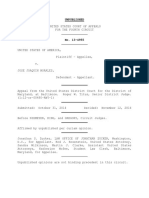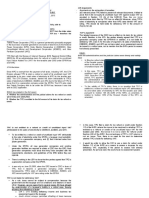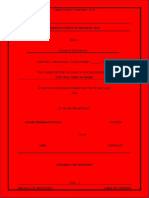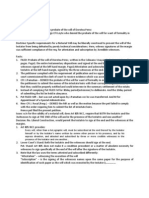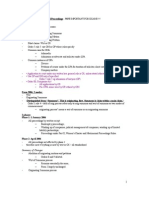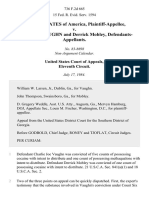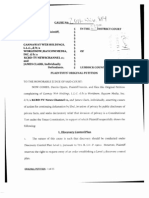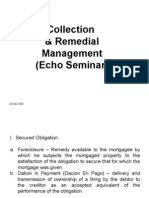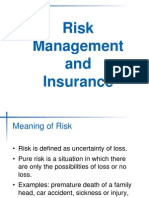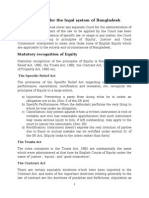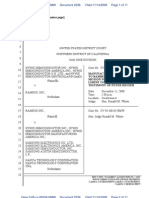Heirs of Valeriano Concha vs. Spouses Gregorio Lumocso Facts
Heirs of Valeriano Concha vs. Spouses Gregorio Lumocso Facts
Uploaded by
Glossier PlayCopyright:
Available Formats
Heirs of Valeriano Concha vs. Spouses Gregorio Lumocso Facts
Heirs of Valeriano Concha vs. Spouses Gregorio Lumocso Facts
Uploaded by
Glossier PlayOriginal Description:
Original Title
Copyright
Available Formats
Share this document
Did you find this document useful?
Is this content inappropriate?
Copyright:
Available Formats
Heirs of Valeriano Concha vs. Spouses Gregorio Lumocso Facts
Heirs of Valeriano Concha vs. Spouses Gregorio Lumocso Facts
Uploaded by
Glossier PlayCopyright:
Available Formats
HEIRS OF VALERIANO CONCHA vs.
SPOUSES GREGORIO LUMOCSO
Facts:
Petitioners, heirs of spouses Dorotea and Valeriano Concha, Sr., claim to be the rightful
owners of a 2 lots all situated in Cogon, Dipolog City, under Section 48(b) of Commonwealth
Act No. 141 (C.A. No. 141), otherwise known as the Public Land Act. Respondent
siblings Lumocso are the patent holders and registered owners of the subject lots.
The Heirs of Valeriano filed for a complaint for Reconveyance and/or Annulment of Title
with Damages against respondents, seeking to annul Free Patent and the corresponding Original
Certificate of Title issued in the name of "Gregorio Lumocso" covering a certain parcel of land.
Respondents moved for the dismissal of the respective cases against them on the same
grounds of: (a) lack of jurisdiction of the RTC over the subject matters of the complaints; (b)
failure to state causes of action for reconveyance; (c) prescription; and (d) waiver, abandonment,
laches and estoppel. On the issue of jurisdiction, respondents contended that the RTC has no
jurisdiction over the complaints pursuant to Section 19(2) of Batas Pambansa Blg. (B.P.) 129, as
amended by R.A. No. 7691, as in each case, the assessed values of the subject lots are less than
P20,000.00. Petitioners opposed, contending that the instant cases involve actions the subject
matters of which are incapable of pecuniary estimation which, under Section 19(1) of B.P. 129,
as amended by R.A. 7691, fall within the exclusive original jurisdiction of the RTCs. They also
contended that they have two main causes of action: for reconveyance and for recovery of the
value of the trees felled by respondents. Hence, the totality of the claims must be considered
which, if computed, allegedly falls within the exclusive original jurisdiction of the RTC.
Trial court DENIED the Motion to Dismiss of the respondents. CA REVERSED the resolutions
and order of the trial court. It held that even assuming that the complaints state a cause of action,
the same have been barred by the statute of limitations. Furthermore, an action for reconveyance
based on fraud prescribes in ten (10) years, hence, the instant complaints must be dismissed as
they involve titles issued for at least twenty-two (22) years prior to the filing of the complaints.
Hence this appeal by certiorari under Rule 45.
Issue:
WON RTC has jurisdiction over the complaints herein pursuant to Section 19(2) of Batas
Pambansa Blg. (B.P.) 129, as amended by R.A. No. 7691
Held: No. MTC has the jurisdiction over the subjected value.
Jurisdiction over the subject matter is the power to hear and determine cases of the
general class to which the proceedings in question belong. It is conferred by law and an objection
based on this ground cannot be waived by the parties. To determine whether a court has
jurisdiction over the subject matter of a case, it is important to determine the nature of the cause
of action and of the relief sought. The trial court correctly held that the instant cases involve
SPECIAL CIVIL ACTIONS – J. AQUINO
2017
actions for reconveyance. An action for reconveyance respects the decree of registration as
incontrovertible but seeks the transfer of property, which has been wrongfully or erroneously
registered in other persons' names, to its rightful and legal owners, or to those who claim to have
a better right. There is no special ground for an action for reconveyance. It is enough that the
aggrieved party has a legal claim on the property superior to that of the registered owner and that
the property has not yet passed to the hands of an innocent purchaser for value.
Being in the nature of actions for reconveyance or actions to remove cloud on one's title,
the applicable law to determine which court has jurisdiction is Section 19(2) of B.P. 129, as
amended by R.A. No. 7691:
“Section 19. Jurisdiction in Civil Cases.-- Regional Trial Courts shall exercise
exclusive original jurisdiction:
(2) In all civil actions which involve the title to, or possession of, real property, or
any interest therein, where the assessed value of the property involved exceeds Twenty
thousand pesos (P20,000.00) or for civil actions in Metro Manila, where such value
exceeds Fifty thousand pesos (P50,000.00) except actions for forcible entry into and
unlawful detainer of lands or buildings, original jurisdiction over which is conferred
upon the Metropolitan Trial Courts, Municipal Trial Courts, and Municipal Circuit Trial
Courts”;
In the cases at bar, it is undisputed that the subject lots are situated in Cogon, Dipolog
City and their assessed values are less than P20,000.00. Hence, the MTC clearly has jurisdiction.
Petitioners' contention that this case is one that is incapable of pecuniary estimation under the
exclusive original jurisdiction of the RTC pursuant to Section 19(1) of B.P. 129 is erroneous. In
a number of cases, SC have held that actions for reconveyance of or for cancellation of title to or
to quiet title over real property are actions that fall under the classification of cases that involve
"title to, or possession of, real property, or any interest therein."
HEIRS OF RETERTA vs. SPS. MORES
G.R. No. 159941; August 17, 2011
DOCTRINE: Certiorari can be the proper remedy despite the availability of appeal or other
remedy if warranted by exceptional reasons such as: (a) when it is necessary to prevent
irreparable damages and injury to a party; (b) where the trial judge capriciously and
whimsically exercised his judgment; (c) where there may be danger of a failure of justice; (d)
where an appeal would be slow, inadequate, and insufficient; (e) where the issue raised is one
purely of law; (f) where public interest is involved; and (g) in case of urgency.
FACTS:
Teofilo Reterta was granted a friar land in Tanza, Cavite, by virtue of his open, exclusive and
continued occupation for more than 30 years. He died in 1983 leaving behind the land to his
heirs, the petitioners. The petitioners discovered in 1999 that there was an affidavit purportedly
executed by their father waiving his rights and interest over the land, and by virtue of such
affidavit, a Sale Certificate and TCT was issued in favor of the respondents.
The petitioners filed an action for quieting of title and reconveyance alleging that such affidavit
SPECIAL CIVIL ACTIONS – J. AQUINO
2017
was a forgery and the sale certificate and TCT were procured fraudulently.
The respondents filed a motion to dismiss, insisting that the RTC had no jurisdiction on the
ground that the Director of Lands had the exclusive power to the propriety of grant of Friar
lands, and to determine whether or not there is fraud in procuring the sales certificate.
Agreeing with the ground, the RTC granted the Motion to Dismiss. Receiving the Order of
Dismissal on Nov.16, 2001, the petitioners filed an MR on Nov.26. However, the RTC denied
the MR in its order, which was received by the petitioners on March 20, 2002, thus, prompting
them to file a petition for certiorari with the CA on May 15, 2002.
The CA dismissed the petition, holding that certiorari cannot be used as a substitute for the lost
remedy of appeal, considering that the order granting the Motion to Dismiss was a final order
against which the proper remedy was an appeal in due course.
Hence, the appeal to the SC.
ISSUE: WON the Petition for Certiorari was proper.
HELD: YES, Certiorari was proper.
At first, the SC held that the contention of the petitioners that their proper remedy was certiorari
by virtue of Rule 41 was misplaced. According to Sec.1, Rule 41 (not yet amended by AM 7-7-
12 during the decision of the CA) an Order denying a Motion for New Trial or Reconsideration
is one of the cases where no appeal may be taken from and the proper remedy is to avail of
Certiorari under Rule 65. However, in this case, what the petitioners really wanted to obtain
relief from was the Order of Dismissal which finally disposed of the case, and not the denial of
their MR. The general rule is that certiorari is precluded as a remedy against the final order when
appeal is available.
Nonetheless, the SC considered Certiorari as the proper remedy despite the availability of appeal
or other remedy if warranted by exceptional reasons such as: (a) when it is necessary to prevent
irreparable damages and injury to a party; (b) where the trial judge capriciously and whimsically
exercised his judgment; (c) where there may be danger of a failure of justice; (d) where an appeal
would be slow, inadequate, and insufficient; (e) where the issue raised is one purely of law; (f)
where public interest is involved; and (g) in case of urgency.
Thus, the CA should have given due course to and granted the petition for certiorari on two
reasons: (a) the broader interest of justice demanded it in order to avoid the undeserved grossly
unjust result that would befall the petitioners; and (b) the RTC’s grant of the MTD on the ground
of lack of jurisdiction evidently constituted grave abuse of discretion amounting to excess of
jurisdiction.
For the first reason, the petitioners’ complaint made out a good case considering its allegations,
if duly established, might warrant reconveyance of the land to them from the petitioners, as the
title of a friar land obtained by a grantee may be assailed and nullified if found not in conformity
with the requirements set by law.
SPECIAL CIVIL ACTIONS – J. AQUINO
2017
For the second, according to BP.129 as amended, the RTC has exclusive original jurisdiction
over actions involving title or possession of real property, which includes an action for quieting
of title (considering the jurisdictional amount) and the authority of the Director of Lands (now
the LMB) is limited to the administration and disposition of friar lands, and does not include
actions for reconveyance.
SABITSANA JR. VS MUERTEGUI
G.R. No. 181359, August 5, 2013 703 SCRA 145
Facts:
Petitioner Clemencio Sabitsana was the counsel of the respondent, Juanito Muertegui. The
dispute involved a parcel of land bought by Juanito by virtue of an unnotarized deed of sale from
Alberto Garcia. Juanito’s father and his brother Domingo, took actual possession of the land.
Later on, Garcia sold the same land to the petitioner this time, through a notarized deed of sale.
When the respondents’ father passed away, the heirs applied for the registration and coverage of
the lot under Public Land Act or CA No. 141. Petitioner opposed the application, claiming he
was the true owner of the lot. Respondent filed for quieting of title and preliminary injunction
against petitioners Clemencio and his wife, Rosario, claiming that they bought the land in bad
faith and are exercising possession and ownership of the same, which acts thus constitute a cloud
over the title.
Issue:
Who between petitioners and respondent has a better right to the disputed lot?
Held:
Respondent has a better right to the lot.
What applies in this case is Act No. 3344 as amended, which provides for the system of
recording of transactions over unregistered real estate. The said act expressly declares that any
registration made shall be without prejudice to a third party with a better right.
SPECIAL CIVIL ACTIONS – J. AQUINO
2017
The sale to respondent Juanito was executed via an unnotarized deed of sale ten years earlier
than that of the sale to petitioners, though this was made via a notarized document. Thus, Juanito
who was the first buyer has a better right to the lot, while the subsequent sale to petitioners is
null and void, because when it was made, the seller Garcia was no longer the owner of the lot.
The fact that the sale to Juanito was not notarized does not alter anything, since the sale between
him and Garcia remains valid nonetheless. Notarization, or the requirement of a public document
under the Civil Code is only for convenience, and not for validity or enforceability. And because
it remained valid as between Juanito and Garcia, the latter no longer had the right to sell the lot
to petitioners, for his ownership thereof had ceased.
Nor can petitioners’ registration of their purchase have any effect on Juanito’s rights. The mere
registration of a sale in one’s favor does not give him any right over the land if the vendor was
no longer the owner of the land, having previously sold the same to another even if the earlier
sale was unrecorded. Registration does not vest title; it is merely the evidence of such title. Our
land registration laws do not give the holder any better title than what he actually has.
SPOUSES CRUZ vs. LEIS
On 27 April 1955, Gertrudes, married to Adriano Isidro, acquired from the then Department of
Agriculture and Natural Resources (DANR) a parcel of land situated at Bo. Sto. Niño, Marikina,
Rizal. On 2 March 1956, the property was registered and TCT No. 43100 solely in the name of
"Gertrudes Isidro, widow," was issued. On 5 February 1985, Gertrudes obtained a loan from
petitioners, secured by a mortgage over the said property. On 11 March 1986, Gertrudes, unable
to pay her obligation, executed two contracts in favor of petitioner Alexander Cruz. The first was
denominated as "Kasunduan," which the parties conceded was a pacto de retro sale, granting
Gertrudes one year within which to repurchase the property. The second was a "Kasunduan ng
Tuwirang Bilihan," a Deed of Absolute Sale covering the same property. For failure of Gertrudes
to repurchase the property, ownership thereof was consolidated in the name of Alexander Cruz
and TCT No. 130584 was issued in his name. On 9 June 1987, Gertrudes Isidro died. Thereafter,
her heirs, herein private respondents, received demands to vacate the premises from petitioners.
Hence, private respondents filed an action before the Regional Trial Court (RTC) of Pasig
seeking the nullification of the contracts of sale as well as the title subsequently issued in the
name of petitioners. Private respondents claimed, among others, that the said property was
conjugal and, consequently, its sale without the knowledge and consent of private respondents
was in derogation of their rights as heirs. Thereafter, the trial court rendered a decision in favor
of private respondents. On appeal, the Court of Appeals affirmed the decision of the trial court
holding that since the property was acquired during the marriage of Gertrudes to Adriano, the
same was presumed to be conjugal property. It, however, found that Gertrudes as well as private
respondents failed to repurchase the property within the period stipulated and had lost all their
SPECIAL CIVIL ACTIONS – J. AQUINO
2017
rights. Nevertheless, it still ruled against petitioners holding that there was no compliance with
Article 1607 of the Civil Code requiring a judicial hearing before registration of the property in
the name of petitioners. Hence, this petition.
ISSUE: Whether or not the land in question is conjugal property, and therefore subject to the
rules on co-ownership?
It bears stressing that notwithstanding Article 1607, the recording in the Registry of Property of
the consolidation of ownership of the vendee is not a condition sine qua non to the transfer of
ownership. Petitioners are the owners of the subject property since neither Gertrudes nor her co-
owners redeemed the same within the one-year period stipulated in the "Kasunduan." The
essence of a pacto de retro sale is that title and ownership of the property sold are immediately
vested in the vendee a retro, subject to the resolutory condition of repurchase by the vendor a
retro within the stipulated period. Failure thus of the vendor a retro to perform said resolutory
condition vests upon the vendee by operation of law absolute title and ownership over the
property sold. As title is already vested in the vendee a retro, his failure to consolidate his title
under Article 1607 of the Civil Code does not impair such title or ownership for the method
prescribed thereunder is merely for the purpose of registering the consolidated title. The Supreme
Court, therefore, modified the decision of the Court of Appeals. It ordered the cancellation of
TCT No. 130584, which was issued without judicial order, and the reinstatement of Transfer
Certificate of Title No. 43100 in the name of Gertrudes Isidro, without prejudice to compliance
by petitioners with the provisions of Article 1607 of the Civil Code.
JARDELEZA vs. SERENO
GR 213181 August 19, 2014
Facts:
Following Justice Abad’s compulsory retirement, the JBC announced the application or
recommendations for the position left by the Associate Justice. Jardeleza, the incumbent Sol-
Gen at the time, was included in the list of candidates. However, he was informed through
telephone call from some Justices that the Chief Justice herself – CJ Sereno, will be invoking Sec
2, Rule 10 of JBC-009 or the so-called “unanimity rule” against him. Generally, the rule is that
an applicant is included in the shortlist when s/he obtains affirmative vote of at least a majority
of all the members of the JBC. When Section 2, Rule 10 of JBC-009, however, is invoked
because an applicant’s integrity is challenged, a unanimous vote is required. Jardeleza was then
SPECIAL CIVIL ACTIONS – J. AQUINO
2017
directed to make himself available on June 30, 2014 before the JBC during which he would be
informed of the objections to his integrity.
Jardeleza wrote a letter-petition asking the SC to exercise its supervisory power and direct the
JBC to, among others, give Jardeleza a written notice and sworn written statements of his
oppositors or any documents in the JBC hearings, and to disallow CJ Sereno from participating
in the voting process for nominees on June 30, 2014.
During the June 30, 2014 meeting of the JBC, Justice Carpio appeared and disclosed a
confidential information which, to CJ Sereno, characterized Jardeleza’s integrity as
dubious. Jardeleza demanded that CJ Sereno execute a sworn statement specifying her
objections and that he be afforded the right to cross-examine her in a public hearing. He also
requested deferment of the JBC proceedings, as the SC en banc has yet to decide in his letter-
petition.
However, the JBC continued its deliberations and proceeded to vote for the nominees to be
included in the shortlist. Thereafter, the JBC released the shortlist of 4 nominees. It was revealed
later that there were actually 5 nominees who made it to the JBC shortlist, but 1 nominee could
not be included because of the invocation of the “unanimity rule”..
Jardeleza filed for certiorari and mandamus via Rule 65 with prayer for TRO to compel the JBC
to include him in the list of nominees on the grounds that the JBC and CJ Sereno acted with
grave abuse of discretion in excluding him, despite having garnered a sufficient number of votes
to qualify for the position.
Remedial Law
Issue 1: W/N the Supreme Court has jurisdiction over the case
Yes. Jardeleza’s allegations in his petitions merits the exercise of the Court’s supervisory
authority over the JBC. Under Sec 8, Art VIII of the Constitution, the JBC shall function under
the supervision of the SC. It follows that such supervisory authority covers the overseeing of
whether the JBC complies with its own rules or not.
Issue 2: W/N a writ of mandamus is available against the JBC
No. The JBC’s duty to nominate is discretionary and it may not be compelled to do something.
Mandamus lies to compel the performance, when refused, of a ministerial duty, but not to
compel the performance of a discretionary duty. Mandamus will not issue to control or review
the exercise of discretion of a public officer where the law imposes upon said public officer the
right and duty to exercise his judgment in reference to any matter in which he is required to
act. It is his judgment that is to be exercised and not that of the court.
SPECIAL CIVIL ACTIONS – J. AQUINO
2017
Issue 3: W/N a writ of certiorari under Sec 1, Rule 65 of the Rules of Court is available against
the JBC (which is not exercising quasi-judicial functions)
Yes. Under the expanded jurisdiction or expanded power of judicial reviewvested to the SC by
the 1987 Constitution, a petition for certiorari is a proper remedy to question the act of any
branch or instrumentality of the government on the ground of grave abuse of discretion
amounting to lack or excess of jurisdiction by any branch or instrumentality of the government,
even if the latter does not exercise judicial, quasi-judicial or ministerial functions.
Political Law
Issue: W/N the right to due process is demandable as a matter of right in JBC proceedings
Yes. While it is true that the JBC proceedings are sui generis, it does not mean that an
applicant’s access to the rights afforded under the due process clause is discretionary on the part
of JBC.
The Court does not brush aside the unique and special nature of JBC
proceedings. Notwithstanding being “a class of its own,” the right to be heard and to explain
one’s self is availing. In cases where an objection to an applicant’s qualifications is raised, the
observance of due process neither contradicts the fulfillment of the JBC’s duty to recommend.
This holding is not an encroachment on its discretion in the nomination process. Actually, its
adherence to the precepts of due process supports and enriches the exercise of its discretion.
When an applicant, who vehemently denies the truth of the objections, is afforded the chance to
protest, the JBC is presented with a clearer understanding of the situation it faces, thereby
guarding the body from making an unsound and capricious assessment of information brought
before it. The JBC is not expected to strictly apply the rules of evidence in its assessment of an
objection against an applicant. Just the same, to hear the side of the person challenged complies
with the dictates of fairness because the only test that an exercise of discretion must surmount is
that of soundness.
Consequently, the Court is compelled to rule that Jardeleza should have been included in the
shortlist submitted to the President for the vacated position of Associate Justice Abad. This
consequence arose not from the unconstitutionality of Section 2, Rule 10 of JBC-009 per se, but
from the violation by the JBC of its own rules of procedure and the basic tenets of due process.
By no means does the Court intend to strike down the “unanimity rule” as it reflects the JBC’s
policy and, therefore, wisdom in its selection of nominees. Even so, the Court refuses to turn a
blind eye on the palpable defects in its implementation and the ensuing treatment that Jardeleza
received before the Council. True, Jardeleza has no vested right to a nomination, but this
does not prescind from the fact that the JBC failed to observe the minimum requirements of due
process.
SPECIAL CIVIL ACTIONS – J. AQUINO
2017
SPECIAL CIVIL ACTIONS – J. AQUINO
2017
You might also like
- Concha v. Lumocso, G.R. No. 158121Document2 pagesConcha v. Lumocso, G.R. No. 158121Teoti Navarro Reyes100% (1)
- Heir of Valeriano Concha Eat Al vs. Spouses Gregorio Lumucso and Bienvenida Guya Et AlDocument2 pagesHeir of Valeriano Concha Eat Al vs. Spouses Gregorio Lumucso and Bienvenida Guya Et AlAMIDA ISMAEL. SALISANo ratings yet
- Heirs of ValerianoDocument3 pagesHeirs of ValerianoCharles Kevin Caparas AbsalonNo ratings yet
- Motion To Dismiss, Insisting That The RTC Had No Jurisdiction ToDocument4 pagesMotion To Dismiss, Insisting That The RTC Had No Jurisdiction Toapril75No ratings yet
- 51 54 Pleadings and PracticeDocument21 pages51 54 Pleadings and PracticeJz DSNo ratings yet
- Ran DPWH Vs TecsonDocument9 pagesRan DPWH Vs TecsonStephen Celoso EscartinNo ratings yet
- CivPro Case 1Document165 pagesCivPro Case 1bidanNo ratings yet
- Spouses Liu v. Court of AppealsDocument6 pagesSpouses Liu v. Court of Appealsf919No ratings yet
- 23 Heirs of Valeriano Concha V SPS LumocsoDocument2 pages23 Heirs of Valeriano Concha V SPS Lumocsopatrixia0% (1)
- Heirs of Yusingco vs. BusilakDocument4 pagesHeirs of Yusingco vs. BusilakRobNo ratings yet
- 15 169344-2014-Metropolitan Fabrics Inc. v. ProsperityDocument7 pages15 169344-2014-Metropolitan Fabrics Inc. v. ProsperitySarah C.No ratings yet
- Civil Pro - Digest - Batch 01 (1-4)Document4 pagesCivil Pro - Digest - Batch 01 (1-4)Boboy SevilleNo ratings yet
- Session 6 Cases CivproDocument125 pagesSession 6 Cases CivproRitch LibonNo ratings yet
- DPWHDocument4 pagesDPWHHoven MacasinagNo ratings yet
- 01 Heirs of Bautista VDocument10 pages01 Heirs of Bautista VJoselle MarianoNo ratings yet
- 49 Cabling Vs Dangcalan - ScraDocument15 pages49 Cabling Vs Dangcalan - ScraJoshua Janine Lugtu0% (1)
- Civil Procedure Cases - Real ActionsDocument13 pagesCivil Procedure Cases - Real ActionsPrincess Hanadi Q. SalianNo ratings yet
- Salvador vs. Patricia, IncDocument19 pagesSalvador vs. Patricia, IncHaze Q.100% (2)
- Civil Procedure - Part 1 Case DigestDocument4 pagesCivil Procedure - Part 1 Case DigestNyanNo ratings yet
- RemRev Digests - ManaloDocument11 pagesRemRev Digests - ManaloFLOYD MORPHEUSNo ratings yet
- Dumaguete V PPA DigestDocument13 pagesDumaguete V PPA DigestIvan Montealegre ConchasNo ratings yet
- Joinder - Salvador v. Patricia, Inc.Document3 pagesJoinder - Salvador v. Patricia, Inc.Chaelle GabatoNo ratings yet
- Heirs of Bautista vs. Lindo, GR 208232, 2014Document10 pagesHeirs of Bautista vs. Lindo, GR 208232, 2014rafaeligdanesNo ratings yet
- Declaratory Relief CasesDocument34 pagesDeclaratory Relief CasesLaw schoolNo ratings yet
- Basanes Case - Acts of ToleranceDocument8 pagesBasanes Case - Acts of ToleranceMarcus-Ruchelle MacadangdangNo ratings yet
- Secretary of DPWH vs. TecsonDocument5 pagesSecretary of DPWH vs. TecsonJea ulangkayaNo ratings yet
- (CivProc) Bautista Et Al v. Lindo Et, AlDocument7 pages(CivProc) Bautista Et Al v. Lindo Et, AlLaila Ismael SalisaNo ratings yet
- Decena v. PiqueroDocument4 pagesDecena v. PiqueroAaron James PuasoNo ratings yet
- Spouses Decena V.spouses Piquero, G.R. No. 155736Document7 pagesSpouses Decena V.spouses Piquero, G.R. No. 155736rafaeligdanesNo ratings yet
- G.R. No.198878Document12 pagesG.R. No.198878Karla KatigbakNo ratings yet
- Heirs of Retera V Sps MoresDocument2 pagesHeirs of Retera V Sps MoresTheodore0176100% (2)
- Court of Jurisdiction in Expropriation Suit - Heirs of Spouses Tumang v. National Power CorpDocument8 pagesCourt of Jurisdiction in Expropriation Suit - Heirs of Spouses Tumang v. National Power CorpAngel CabanNo ratings yet
- Civ Pro Assigned DigestsDocument14 pagesCiv Pro Assigned DigestsArlene DurbanNo ratings yet
- Heirs of Reinoso To Jose DiazDocument29 pagesHeirs of Reinoso To Jose DiazLincy Jane AgustinNo ratings yet
- Case Digest CompilationDocument50 pagesCase Digest CompilationJay-r Eniel Arguelles100% (2)
- Realty Sales Enterprise, Inc. vs. Intermediate Appellate Court, Et Al. (154 SCRA 328)Document3 pagesRealty Sales Enterprise, Inc. vs. Intermediate Appellate Court, Et Al. (154 SCRA 328)Earvin James Atienza0% (1)
- Civil Procedure Case Digests (Rule 37 and Rule 38)Document54 pagesCivil Procedure Case Digests (Rule 37 and Rule 38)Maestro LazaroNo ratings yet
- Constitution Statutes Executive Issuances Judicial Issuances Other Issuances Jurisprudence International Legal Resources AUSL ExclusiveDocument9 pagesConstitution Statutes Executive Issuances Judicial Issuances Other Issuances Jurisprudence International Legal Resources AUSL ExclusivemehNo ratings yet
- Serrano v. Spouses GutierrezDocument7 pagesSerrano v. Spouses GutierrezHyules PamisaNo ratings yet
- Spouses Liu v. EspinosaDocument6 pagesSpouses Liu v. Espinosasharief abantasNo ratings yet
- Heirs of Yusingco vs. BusilakDocument4 pagesHeirs of Yusingco vs. BusilakRobNo ratings yet
- Spouses Decena VS Spouses PiqueroDocument4 pagesSpouses Decena VS Spouses PiqueroJesse RazonNo ratings yet
- Pactum lEGAL DOCS AmoebaDocument19 pagesPactum lEGAL DOCS AmoebaIan SabornidoNo ratings yet
- Missing Rem CasesDocument7 pagesMissing Rem CasesToniNarcisoNo ratings yet
- Ross Rica Sales Center Inc. Vs Spouses OngDocument13 pagesRoss Rica Sales Center Inc. Vs Spouses OngMarianeHernandezNo ratings yet
- Philippine Cotton V GagoonDocument10 pagesPhilippine Cotton V GagoonRogie ToriagaNo ratings yet
- Gabrillo v. Heirs of PastorDocument5 pagesGabrillo v. Heirs of PastorJade ClementeNo ratings yet
- Glynna Foronda Cystal VS Son DGDocument7 pagesGlynna Foronda Cystal VS Son DGMaricel Pereña Diesta PajanustanNo ratings yet
- Secretary of The DPWH v. Spouses Tecson, G.R. No. 179334, July 1, 2013 (Decision) April 21, 2015 (Resolution)Document8 pagesSecretary of The DPWH v. Spouses Tecson, G.R. No. 179334, July 1, 2013 (Decision) April 21, 2015 (Resolution)Ryuzaki HidekiNo ratings yet
- Case On Expropriation 2019Document113 pagesCase On Expropriation 2019Josef Glenn RugaNo ratings yet
- Constitutional Law II Cases (Public Use Under Power of Eminent Domain)Document4 pagesConstitutional Law II Cases (Public Use Under Power of Eminent Domain)Aibel UgayNo ratings yet
- 17 - Heirs of Reterta v. Sps LopezDocument2 pages17 - Heirs of Reterta v. Sps LopezKristine MagbojosNo ratings yet
- RTC Raymundo V CADocument2 pagesRTC Raymundo V CARose Ann CalanglangNo ratings yet
- Roldan vs. BarriosDocument7 pagesRoldan vs. BarriosXIANo ratings yet
- Civil Law DoctrinesDocument21 pagesCivil Law DoctrinesKatrina PetillaNo ratings yet
- Cases 11 20Document10 pagesCases 11 20rpcmarcenasNo ratings yet
- DPWH Secretary V TecsonDocument3 pagesDPWH Secretary V TecsonLaf WonderstruckNo ratings yet
- Ching v. RodriguezDocument3 pagesChing v. RodriguezKenny Robert'sNo ratings yet
- California Supreme Court Petition: S173448 – Denied Without OpinionFrom EverandCalifornia Supreme Court Petition: S173448 – Denied Without OpinionRating: 4 out of 5 stars4/5 (1)
- Supreme Court Eminent Domain Case 09-381 Denied Without OpinionFrom EverandSupreme Court Eminent Domain Case 09-381 Denied Without OpinionNo ratings yet
- City Ordinance No. 2017-087 (G-Xchange, Inc. and Ibayad Online Ventures, Inc.)Document4 pagesCity Ordinance No. 2017-087 (G-Xchange, Inc. and Ibayad Online Ventures, Inc.)Glossier PlayNo ratings yet
- Leus v. SSC WestgroveDocument37 pagesLeus v. SSC WestgroveGlossier PlayNo ratings yet
- Del Val V Del ValDocument2 pagesDel Val V Del ValGlossier PlayNo ratings yet
- Marquez V DesiertoDocument2 pagesMarquez V DesiertoGlossier PlayNo ratings yet
- Reterta V MoresDocument11 pagesReterta V MoresGlossier PlayNo ratings yet
- Taxation 2 Remedies - P.M. ReyesDocument31 pagesTaxation 2 Remedies - P.M. ReyesGlossier PlayNo ratings yet
- Aboitiz v. CADocument21 pagesAboitiz v. CAGlossier PlayNo ratings yet
- Alvizo V Sandiganbayan, 220 SCRA 55, 1993 - Failure To Assert RightDocument14 pagesAlvizo V Sandiganbayan, 220 SCRA 55, 1993 - Failure To Assert RightGlossier PlayNo ratings yet
- JORGE GONZALES, ET AL. v. CLIMAX MINING LTD., ET AL., DigestDocument3 pagesJORGE GONZALES, ET AL. v. CLIMAX MINING LTD., ET AL., DigestGlossier PlayNo ratings yet
- Philippine International Shipping Corporation Vs Court of AppealsDocument2 pagesPhilippine International Shipping Corporation Vs Court of AppealsGlossier Play100% (2)
- United States Court of Appeals, Second Circuit.: No. 732, Docket 84-7820Document5 pagesUnited States Court of Appeals, Second Circuit.: No. 732, Docket 84-7820Scribd Government DocsNo ratings yet
- Equitable Banking Corp v. Calderon DigestDocument2 pagesEquitable Banking Corp v. Calderon Digestlemwel_jl288636100% (1)
- 25 Cargill Phils Inc Vs San Fernando Regala TRD IncDocument15 pages25 Cargill Phils Inc Vs San Fernando Regala TRD IncRio TolentinoNo ratings yet
- Grace Christian High School v. LavanderaDocument2 pagesGrace Christian High School v. LavanderaJaneen ZamudioNo ratings yet
- Sy Yong Hu and Sons Et Al v. CADocument1 pageSy Yong Hu and Sons Et Al v. CAAnakataNo ratings yet
- Created by Students of Knute 2-17 FMTP Diana Smorodina Vladyslav TyshkunDocument18 pagesCreated by Students of Knute 2-17 FMTP Diana Smorodina Vladyslav TyshkunДіана СмородінаNo ratings yet
- Format NCLAT AppealDocument4 pagesFormat NCLAT AppealSCNo ratings yet
- Course Outline 2020 1Document3 pagesCourse Outline 2020 1Gian Tristan MadridNo ratings yet
- United States v. Jose Morales, 4th Cir. (2014)Document5 pagesUnited States v. Jose Morales, 4th Cir. (2014)Scribd Government DocsNo ratings yet
- 9 Traders Insurance & Surety Co. V. Golangco PDFDocument5 pages9 Traders Insurance & Surety Co. V. Golangco PDFKrisleen AbrenicaNo ratings yet
- CIR Vs Toledo DigestDocument2 pagesCIR Vs Toledo DigestClar Napa100% (2)
- Memo Pundits Workshop, 2020: BeforeDocument12 pagesMemo Pundits Workshop, 2020: BeforeshivamNo ratings yet
- Yasa V TurkeyDocument3 pagesYasa V TurkeyCzarPaguioNo ratings yet
- Taboada v. RosalDocument1 pageTaboada v. RosalJazz TraceyNo ratings yet
- 4 Modes of Commencing Civil ProceedingsDocument13 pages4 Modes of Commencing Civil Proceedingsapi-3803117100% (1)
- United States v. Charlie Joe Vaughn and Derrick Mobley, 736 F.2d 665, 11th Cir. (1984)Document3 pagesUnited States v. Charlie Joe Vaughn and Derrick Mobley, 736 F.2d 665, 11th Cir. (1984)Scribd Government DocsNo ratings yet
- Opaitz - KCBD ComplaintDocument25 pagesOpaitz - KCBD ComplaintTexas WatchdogNo ratings yet
- AFP Retirement and Separation Benefits System (AFPRSBS) vs. SanvictoresDocument9 pagesAFP Retirement and Separation Benefits System (AFPRSBS) vs. Sanvictores유니스No ratings yet
- Bwsa BylawsDocument19 pagesBwsa Bylawsapi-242028033No ratings yet
- Remedial and Collection ManagementDocument23 pagesRemedial and Collection ManagementEmily Mauricio100% (2)
- Risk Management and InsuranceDocument64 pagesRisk Management and InsuranceMehak AhluwaliaNo ratings yet
- Tajeda vs. People 691 SCRA 252, 267, February 20, 2013 (Pro Hac Vice)Document2 pagesTajeda vs. People 691 SCRA 252, 267, February 20, 2013 (Pro Hac Vice)Charmila Siplon100% (1)
- Civil Appeal DraftDocument11 pagesCivil Appeal DraftJitendra PrajapatiNo ratings yet
- Equity Under Legal System of BangladeshDocument4 pagesEquity Under Legal System of BangladeshMaruf Allam73% (15)
- Heirs of Juan San Andres (Victor S. Ziga) and Salvacion S. Tria, Petitioners, vs. VICENTE RODRIGUEZ, RespondentDocument7 pagesHeirs of Juan San Andres (Victor S. Ziga) and Salvacion S. Tria, Petitioners, vs. VICENTE RODRIGUEZ, RespondentEcnerolAicnelavNo ratings yet
- SUSI Vs RAZON and Director of Lands, G.R. No. L-24066 FactsDocument4 pagesSUSI Vs RAZON and Director of Lands, G.R. No. L-24066 FactsBeverly Vicente BurcaoNo ratings yet
- (Attorney List On Signature Page) : C N - C 05 00334 RMW C N - C 05 02298 RMW C N - C 06 00244 RMWDocument11 pages(Attorney List On Signature Page) : C N - C 05 00334 RMW C N - C 05 02298 RMW C N - C 06 00244 RMWsabatino123No ratings yet
- Lou MouDocument2 pagesLou MouPaul AbhikNo ratings yet
- Asso V EnergyDocument38 pagesAsso V Energyarriane joy insularNo ratings yet
- LEGAL METHODS IN TANZANIA (Part 1) by MWAKISIKI MWAKISIKI EDWARDSDocument49 pagesLEGAL METHODS IN TANZANIA (Part 1) by MWAKISIKI MWAKISIKI EDWARDSMWAKISIKI MWAKISIKI EDWARDS87% (55)






